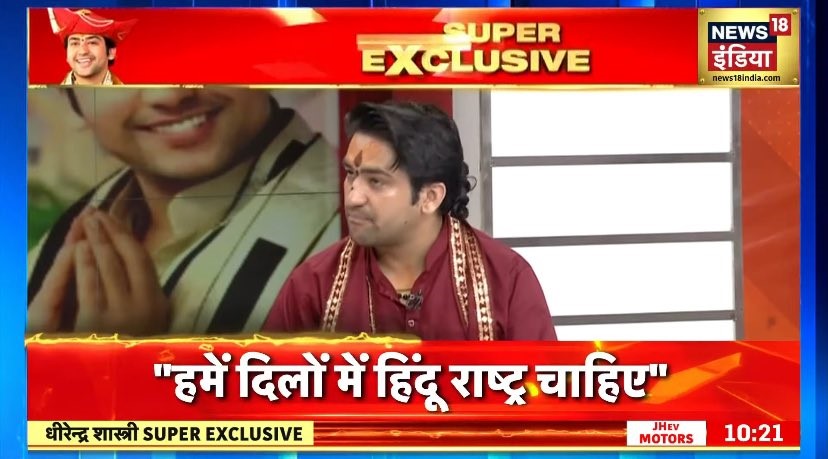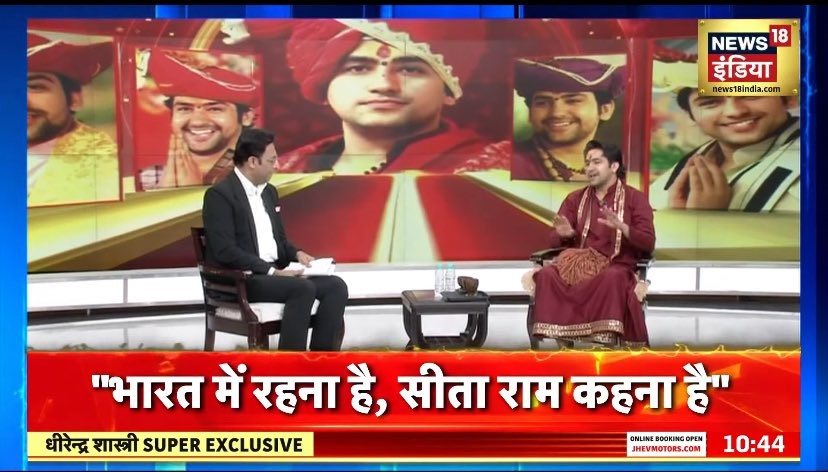On November 4, 2024, an order was issued by the News Broadcasting & Digital Standards Authority (NBDSA) in favour of activist Indrajeet Ghorpade, who had complaint against a show broadcasted by News18 India. The complaint centres on a controversial program aired by News18 on July 9, 2023, featuring an interview with Dhirendra Krishna Shastri, a religious preacher, known for his contentious and divisive views on faith, supernatural abilities, and controversial religious issues.
The complainant, Ghorpade, had alleged in the complaint that this broadcast violated NBDSA’s regulatory standards, which are designed to prevent content that promotes superstition, glorifies the supernatural, or contributes to religious intolerance. At the heart of the complaint is Shastri’s self-professed supernatural abilities and his inflammatory statements regarding Hindu nationalism and other religions. The program, titled “Baba Bageshwar Exclusive Interview,” is claimed to have allowed Shastri to make statements without adequate disclaimers or counterpoints, which Ghorpade argues could mislead viewers and incite religious disharmony.
The following sections provide a detailed breakdown of the complaint, the broadcaster’s response, the complainant’s counterarguments, and the final ruling by NBDSA.
Issues raised by the complainant
Ghorpade filed the complaint on July 11, 2023, two days after the program aired, citing concerns over how the program presented Shastri’s controversial views without sufficient context or disclaimers. Specifically, Shastri claimed supernatural abilities, stating he could locate missing animals, predict elections, and discover hidden resources, such as diamonds, through mystical means. Additionally, he made bold assertions about converting India into a “Hindu nation” and used language that could be interpreted as inflammatory towards other religious groups. Ghorpade’s grievance was that News18 India had violated NBDSA’s Code of Ethics by allowing this content, which, he argued, glorified superstition, risked misleading viewers, and potentially incited communal tension.
The complainant raised multiple concerns regarding the nature and content of the broadcast, which, he argued, contained misleading information and reflected bias. He pointed out that the broadcast painted individuals involved in a negative light without sufficient factual basis, potentially damaging their reputations. According to the complaint, the program failed to offer a balanced perspective, choosing instead to highlight certain narratives over others, which resulted in “sensationalism over factual reporting.”
The complaint cited specific examples from the broadcast that allegedly violated NBDSA’s guidelines on impartiality and objectivity. Ghorpade’s submission underscored that the broadcaster’s portrayal was not only inaccurate but was presented in a way that amplified a single viewpoint, neglecting alternative perspectives that were crucial to an unbiased understanding of the issue.

Broadcaster’s submissions
News18 India defended itself by emphasising that the interview with Shastri was live, making it challenging for the anchor to fact-check or control Shastri’s spontaneous statements. The broadcaster argued that the views expressed during the interview were solely those of Shastri and were neither endorsed nor supported by the channel. News18 India also highlighted that Shastri was a prominent figure whose activities had captured public interest, and, as such, there was legitimate news value in covering his perspectives. The channel claimed its anchor made efforts to clarify that Shastri’s claims were personal beliefs and not objective truths.
In addition to this, the broadcaster defended its editorial choices, asserting that the program had been created within the bounds of journalistic freedom and served a legitimate public interest. The broadcaster argued that its intent was to inform viewers about pertinent issues, and it claimed that the broadcast was factually accurate. Furthermore, they maintained that editorial decisions were made in accordance with standard practices, emphasising that the program was not designed to mislead or harm any party involved.
The broadcaster further cited its right to freedom of expression, insisting that its reporting provided a necessary platform for public discourse on critical issues. They claimed that their team had followed due diligence, presenting the story in a responsible manner. According to the broadcaster’s submission, the program’s approach was “consistent with the norms of ethical journalism” and in line with industry standards.
The complainant’s rebuttal
In response, Ghorpade countered that broadcasters have a responsibility to ensure that the content aired on their platforms does not contravene ethical standards, even if made by guests. He argued that News18 India’s decision to feature Shastri—whose controversial views were widely known—without more stringent oversight, violated NBDSA guidelines. Furthermore, he contended that the program’s lack of sufficient rebuttal or critical questioning could lead viewers to accept Shastri’s supernatural claims as credible. Ghorpade requested strict action against News18 India to reinforce that broadcasters are accountable for the statements of their guests, especially when these statements are divisive or irrational.
Decision of the NBDSA
After carefully considering both the complaint and the broadcaster’s defence, the NBDSA ruled in favour of Ghorpade, finding that the broadcaster had indeed violated its standards. The authority concluded that the program “lacked a balanced approach,” a requirement that is integral to fair and responsible journalism. In the order, the NBDSA remarked that while freedom of the press is vital, it must be exercised with responsibility to avoid harm or misinformation.
The NBDSA instructed the broadcaster to issue a public apology to address the misleading aspects of the broadcast. Additionally, it directed the broadcaster to take corrective actions to prevent similar incidents in the future. “This decision,” the NBDSA stated in its order, “should serve as a reminder to all media organisations about the necessity of upholding ethical journalism standards.” The ruling made it clear that sensationalism should never replace factual reporting, and it emphasised the importance of presenting a balanced narrative.
The Authority noted that broadcasters have the editorial freedom to invite guests; however, this freedom is not without limits. NBDSA found that Shastri’s statements promoting superstition and making divisive religious claims were irresponsible and risked promoting communal disharmony. The Authority criticised the broadcaster for not issuing clear disclaimers and not challenging Mr. Shastri’s claims more rigorously.
As a result, NBDSA issued a warning to News18 India, advising against inviting guests likely to promote superstitious beliefs or socially divisive opinions. It also directed the broadcaster to remove the interview from all digital platforms and confirm this action in writing within seven days. The NBDSA stressed the importance of responsible journalism and reminded News18 India of its obligation to adhere to standards that ensure content does not mislead or promote irrational beliefs.
The NBDSA’s decision in this case underscores the vital role of media accountability and ethical reporting standards in protecting public trust. By ruling in favour of Ghorpade, the NBDSA has reaffirmed that journalistic freedom must be balanced with a commitment to integrity and impartiality. This ruling serves as a precedent, reinforcing that media organisations are responsible for avoiding sensationalism and presenting a fair, balanced view to their audiences. The NBDSA’s order not only addresses Ghorpade’s concerns but also sends a clear message to the media industry regarding the importance of upholding credibility and trust in journalism.
The complete order can be viewed here:
Related:
CJP seeks action against BJP leaders for alleged hate speech amid Jharkhand polls

